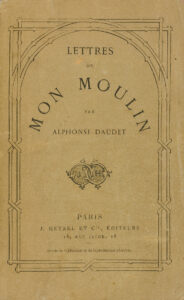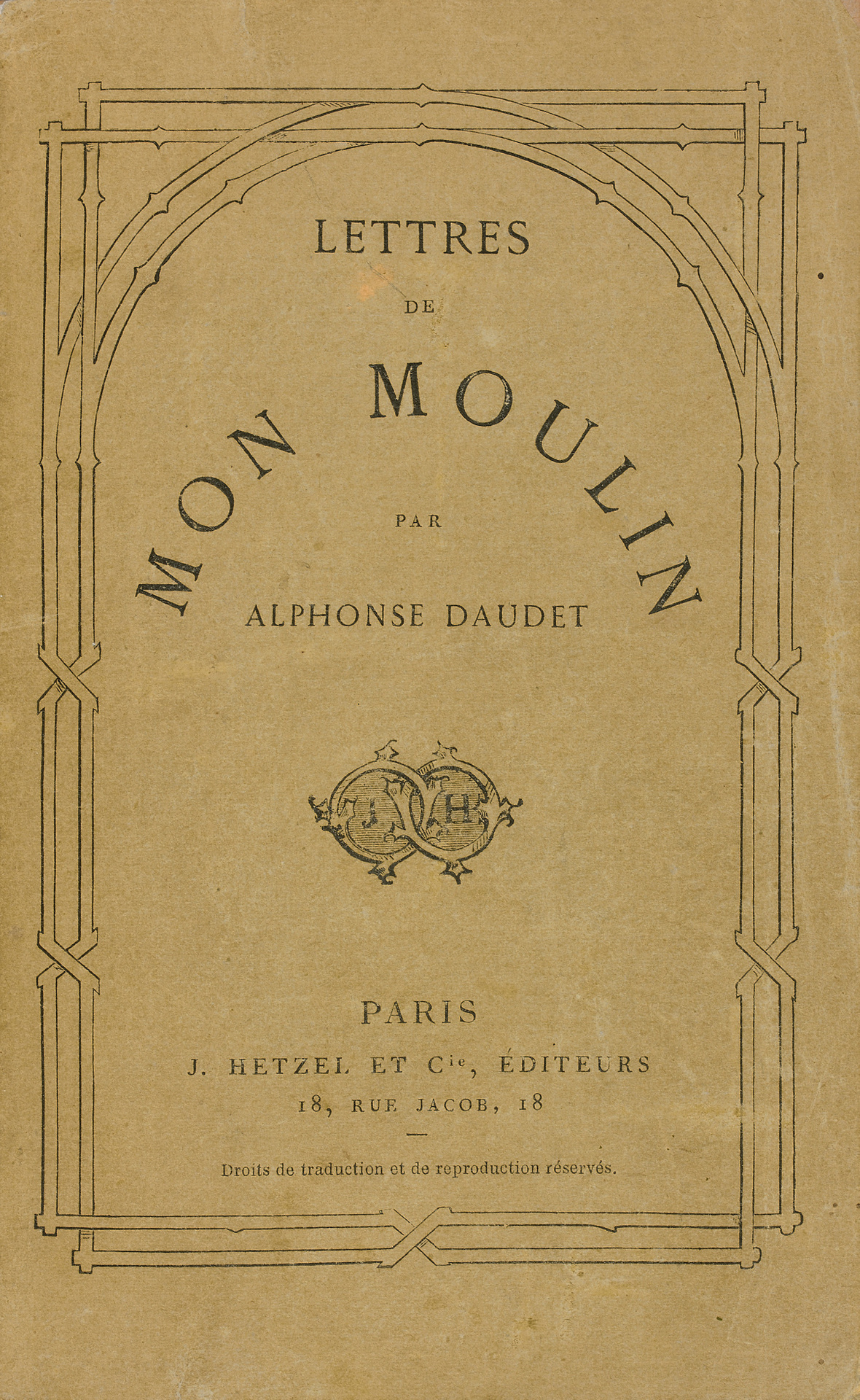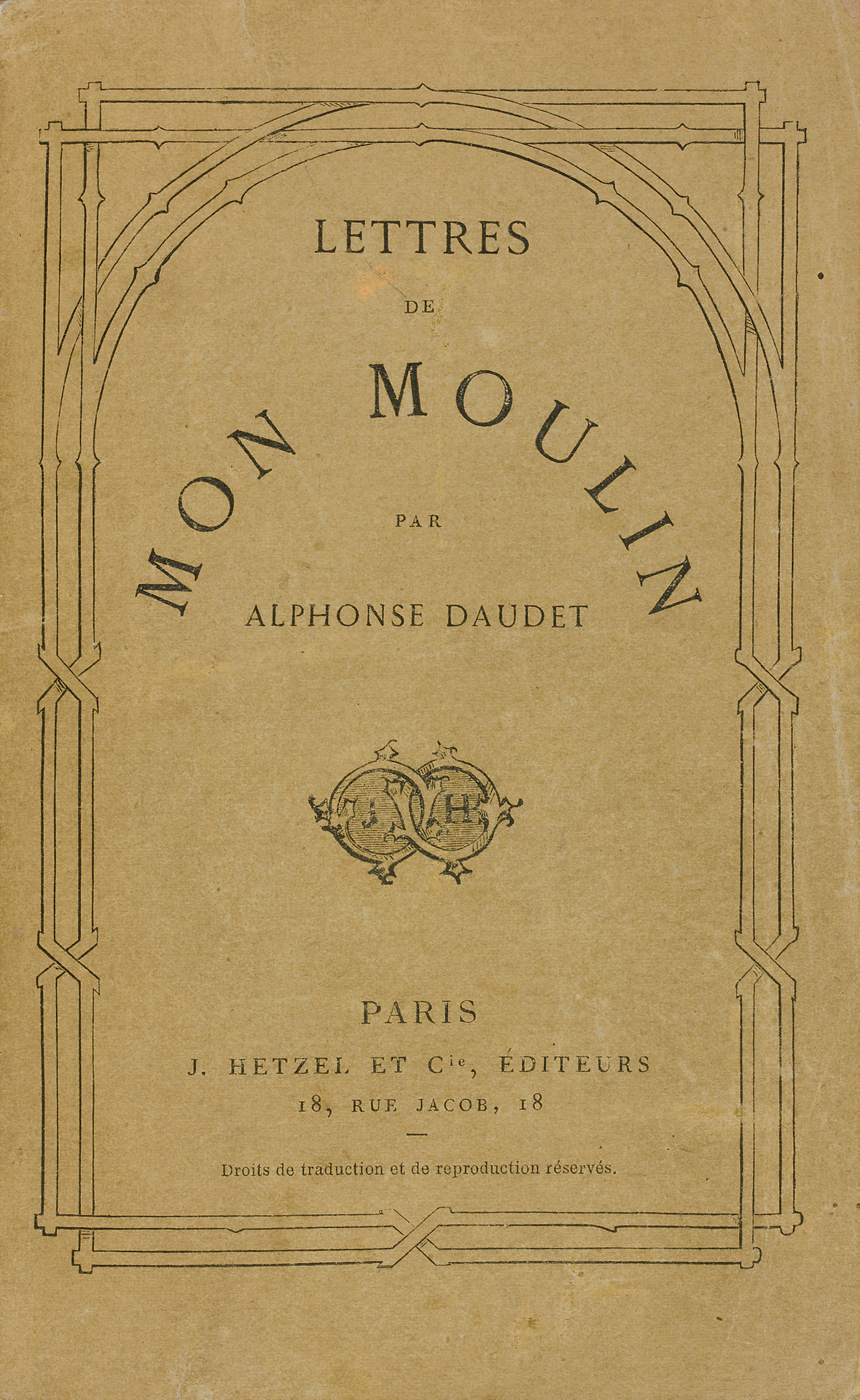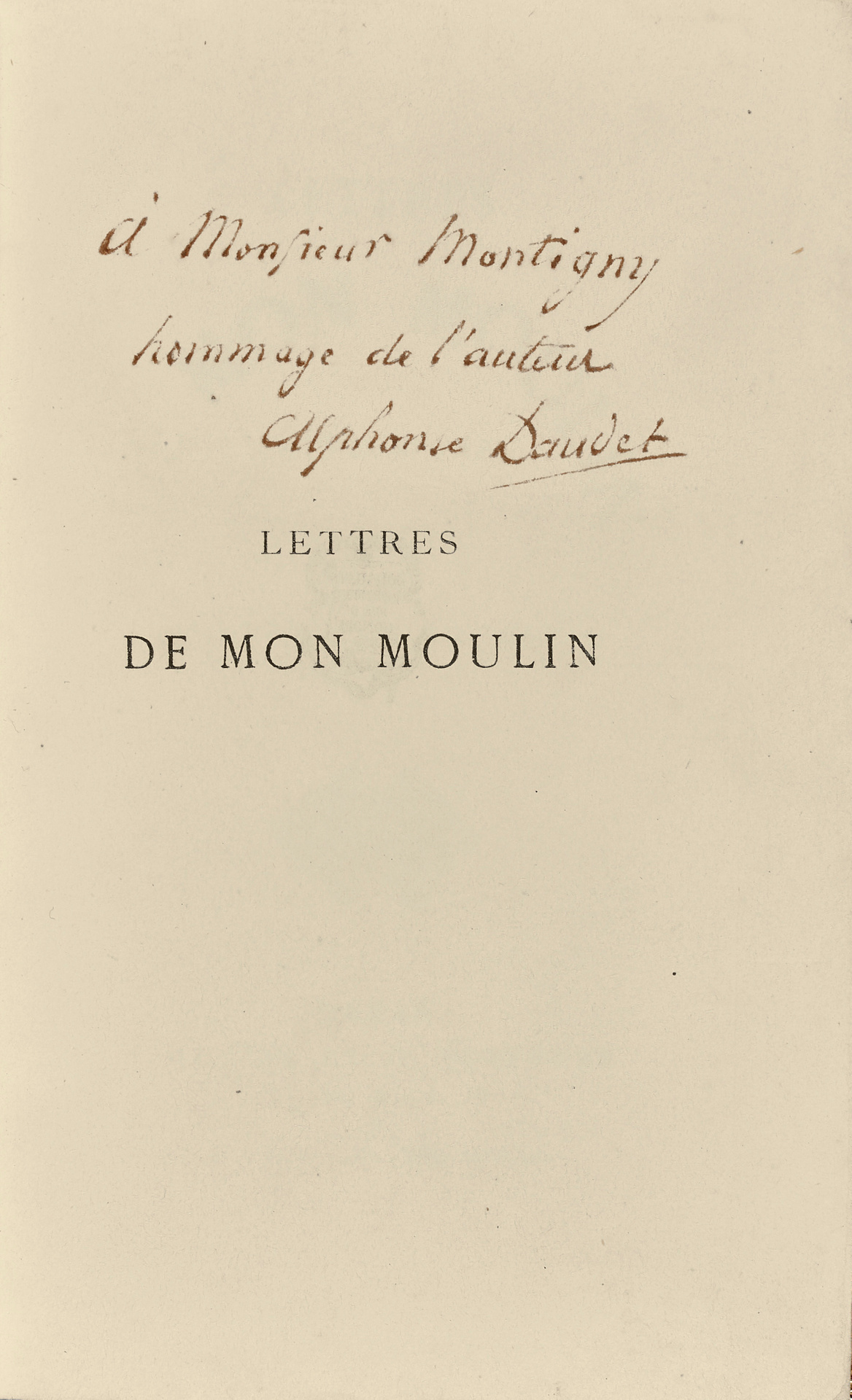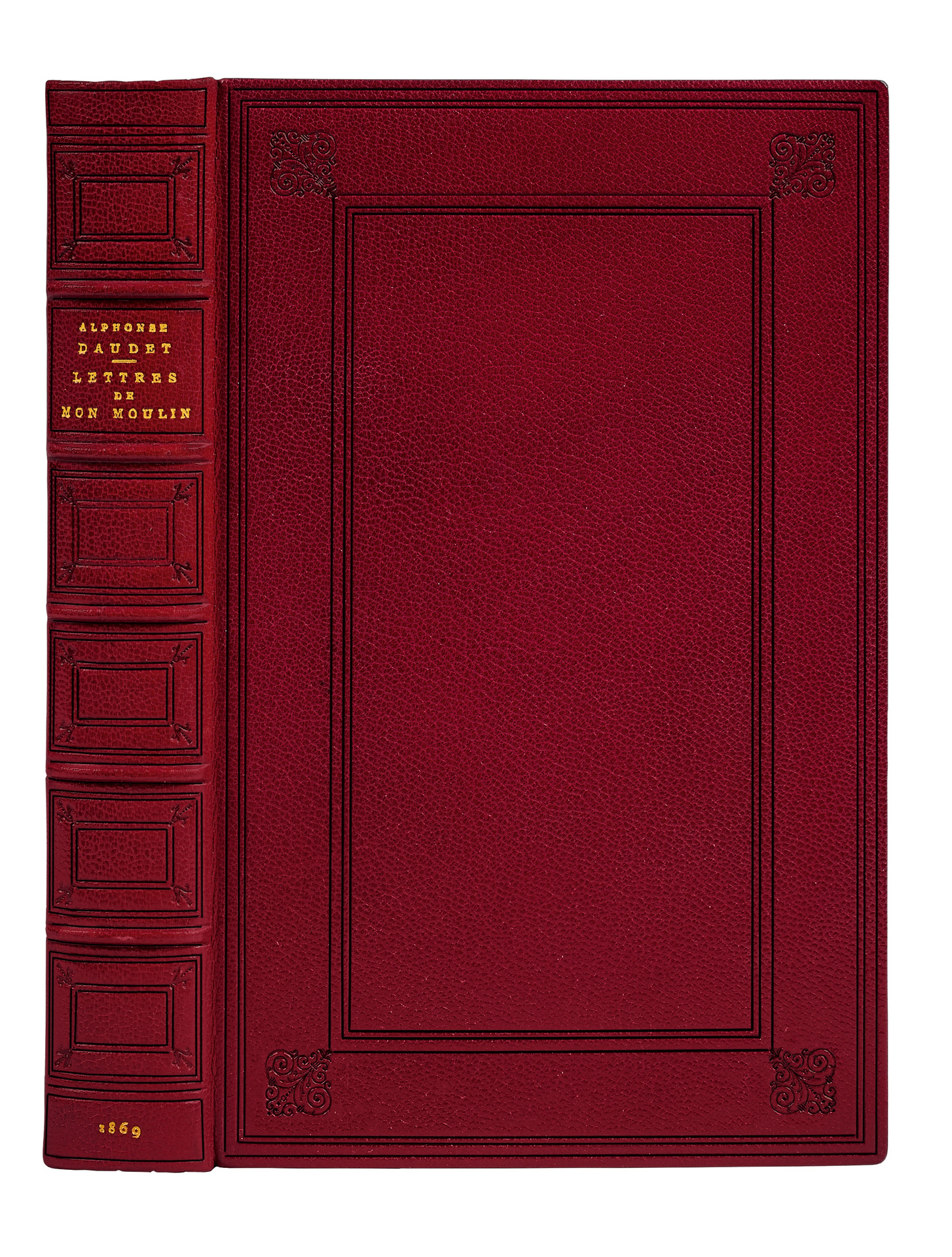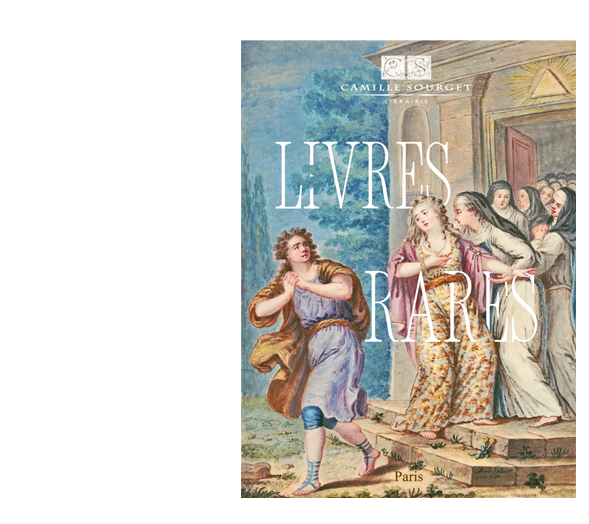Paris, J. Hetzel, n.d. [1869].
12mo [180 x 112 mm] of (2) ll., 302 pp. Bound in full red morocco, double blind-stamped fillets and fleurons in the corner on the covers, spine ribbed decorated the same way,, inner gilt border, gilt edges, original wrappers and spine bound in Slipcase. Devauchelle
First edition of this “very rare and very sought after” work by Alphonse Daudet
(Clouzot, 44).
Carteret, I, 191 ; Vicaire, III, 37 ; Bibliothèque de Backer 2069 ; Talvart, IV, 13.
“Rare book considered as containing the author’s most beautiful tales” (Carteret).
No large-paper copies were printed.
“A collection of stories by Alphonse Daudet (1840-1897) which, as everyone knows, founded the author’s reputation. It anticipates the various novels that Daudet was soon to devote to Provence and which are the best of his work. A faithful child of Provence, Daudet was, up until his death, affected by nostalgia, to the point of feeling in Paris the soul of an outcast. Having always been passionate about life in the South, he took pleasure in writing every aspect of it: prose ballads, naive stories, parables, fantastic and funny tales, not forgetting the landscape: Daudet excelled in writing everything. Some preamble in the form of a bill of sale tells us that the poet has acquired an old Provençal mill in order to give career to his dreams. It was there that he scribbled the thirty or so letters that make up this volume.
Apart from ‘L’Arlésienne’, the best known of these tales are: ‘La chèvre de Monsieur Seguin’, ‘Le secret de maître Cornille’, ‘La mule du pape’, ‘Le curé de Cucugnan’, ‘Le sous-préfet aux champs’, ‘La légende de l’homme à la cervelle d’or’…
What you can taste here is an incomparable mixture of mischief, verve and emotion. But their main quality is the sympathy with which the author attaches himself to the humble, the animals and the plants, with a solicitude that never disarms. The work is that of a ‘goldsmith’ who, with a single stroke of the greatest finesse, can create a climate and define a character whose relief will allow him to remain legendary. It is this simplicity and this art of never ‘pressing’ on anything that makes him one of our greatest storytellers. (Dictionnaire des Œuvres, IV, 172).
“Les Lettres de mon Moulin were published in successive series between August 1866 and October 1869. The originality of this collection of nearly thirty texts remains masked today by the fame of some of them…
Les Lettres de mon moulin are in fact characterised by a dark, sometimes tragic overall colour. The brief story of L’Arlésienne, popularised in its stage version by Bizet’s music, is the most implacable illustration of this; (…) it is the infinite variety of Lettres de mon moulin that most deserves to be brought to light, and that best justifies recommending that they be read in full. (En Français dans le texte, n°291).
A precious copy offered by the author with this autograph dedication on the half title:
« A Monsieur Montigny
Hommage de l’auteur
Alphonse Daudet »
Adolphe Auguste Lemoine, known as Lemoine-Montigny or simply Montigny, born in 1806 in Mons and died on March 6, 1880 in Paris 16th, was a French actor and playwright. He was director of the Gymnase and Gaîté theatres and married the actress Rose Chéri. His wife’s sister Anna had married the actor François-Louis Lesueur, and he was also their brother-in-law, as well as the uncle of the actress Anna Judic. At the time of his death, Lemoine-Montigny was a Knight of the Legion of Honour. He was the brother of the dramatist Gustave Lemoine, husband of the composer Loïsa Puget, and of the man of letters Édouard Lemoine.
Daudet was very well acquainted with Adolphe Lemoine, known as Lemoine. Montigny, playwright and administrator, born in Paris in 1812. Under the name of Montigny (which he later joined to his real name), he made a name for himself in the theatre. First an actor, then director of the Gaîté with M. Meyer, in 1844 he succeeded Delestre-Poirson as director of the Gymnase. A skilful administrator, he was able to bring the theatre back into vogue, and in his hands it became one of the most literary stages in Paris.
“Lemoine-Montigny, the director of the Gymnase under the Second Empire, had played a great role in the evolution of stage direction, particularly in Dumas fils and Sand.
In “Souvenirs d’un homme de lettres”, Alphonse Daudet mentions his friend Montigny as follows: “Fortunately Lafontaine entered the Gymnase and had an incomparable teacher there for ten years. Those who saw the old Montigny in his chair, at the front of the stage, gruff, with a frown on his face, making him repeat the same passage ten times, twenty times, breaking up the hardest, most rebellious ones, always unsatisfied, always striving to do his best, these people can boast of having known a true theatre director. With him, the artist’s talent was disciplined.
Fine and precious wide-margined copy, with the original printed wrappers bound in, of this rare first edition.
Dedications of Alphonse de Daudet on this text are of the greatest rarity.
We have been able to locate only 5 copies of this rare original edition among French institutions: at the B.n.F., at the libraries of Dijon, Pau and Clermont-Ferrand and at the library of the Institut de France in Paris.
